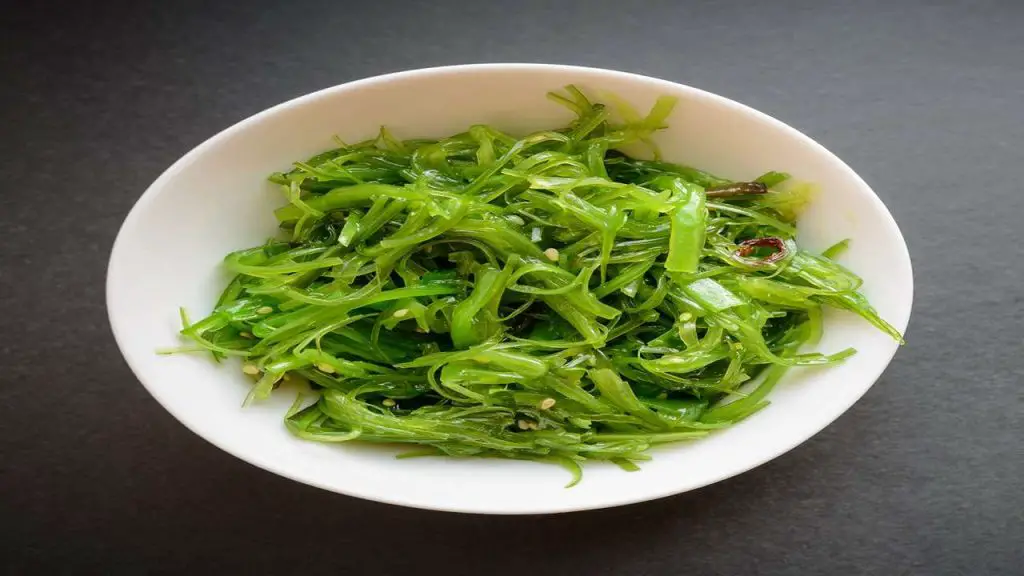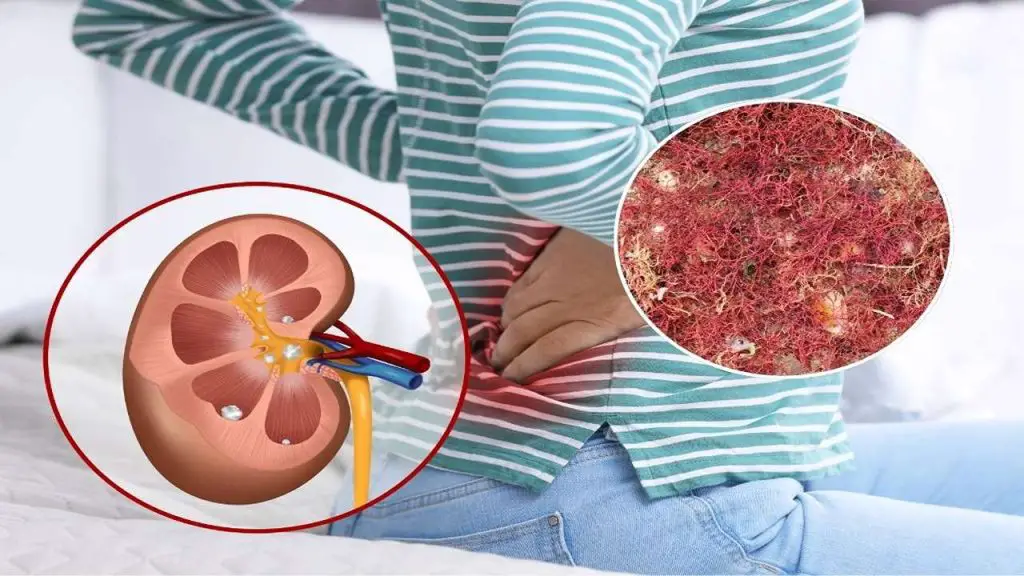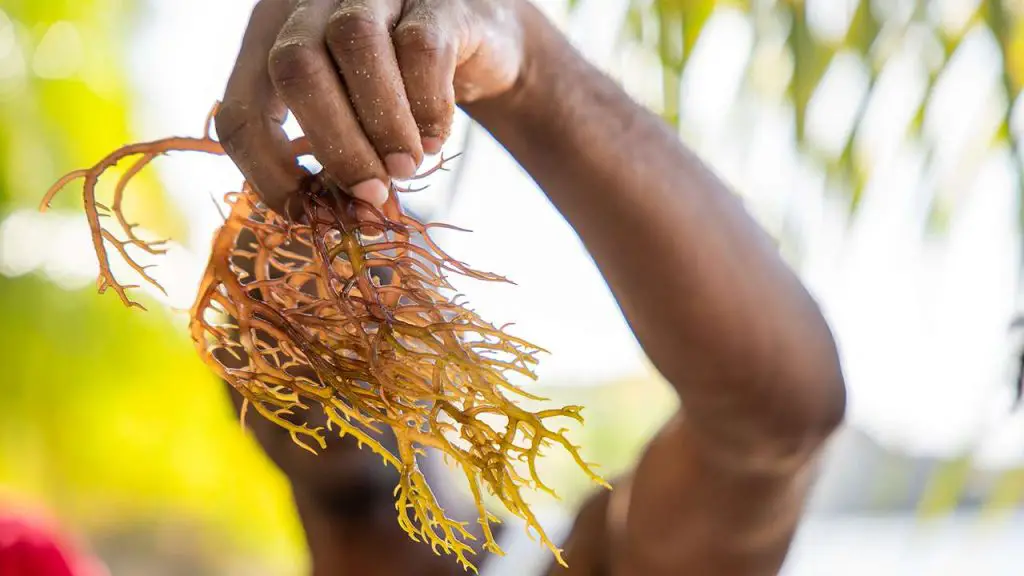As an Amazon Associate I earn from qualifying purchases.
Sea moss, also known as Irish moss, has lately been getting much hype for its potential wellness benefits. But when it comes to kidneys, does sea moss help, or could it cause more harm than good?
The short answer is: it depends.
Sea moss is packed with nutrients that can support different parts of your body, including the kidneys.
It might even help cleanse or detox the system naturally, but it’s not a magic fix like anything else. Depending on your situation, it might not always be the right choice.
This guide will analyze the benefits of sea moss for kidney function health, scientific research on sea moss and kidneys, and how to use it wisely.
Nutritional Profile of Sea Moss

Sea moss nutrition is pretty impressive, and some of these nutrients could make a real difference to your kidneys.
A. Essential Vitamins and Minerals
Sea moss is loaded with minerals your body needs, not just trendy ones.
Here’s a quick peek:
- Potassium helps your kidneys keep fluid levels balanced.
- Magnesium supports muscles (including the ones helping your kidneys filter blood).
- Calcium strengthens bones and helps maintain mineral balance.
- Iodine is important for thyroid health, closely related to how your kidneys regulate certain hormones.
You’ll also find a good dose of vitamins like A, C, E, and K all working behind the scenes to fight inflammation and oxidative stress. If you’re thinking about the benefits of sea moss for kidney health issues, this combination matters more than you might expect.
B. Low Calorie Content
Another thing people like about Irish moss and kidney function is its naturally low in calories and fat.
So if you’re watching your diet or thinking about trying a gentle sea moss kidney cleanse, you won’t have to worry about overloading your system.
C. Vegan and Gluten-free Properties
Sea moss is totally plant-based and naturally gluten-free. It fits into any diet, important if you’re trying to keep things simple and safe with kidney-friendly sea moss supplements.
And because it’s free of common allergens, it’s usually a safer bet for folks who are being extra careful about what they put in their body.
Sea moss offers general health benefits due to its nutrient content. But what about its impact on kidney health? Let’s learn in the next section.
Potential Benefits for Kidney Health
While sea moss isn’t a cure-all, it does offer some natural support that your kidneys might appreciate.
A. Rich in Kidney-Supporting Nutrients
People explore sea moss for kidneys because it’s packed with minerals like potassium and magnesium. These minerals help balance fluids and support blood pressure, the two things critical for keeping your kidneys healthy.
If you’re thinking about adding a kidney-friendly sea moss dietary supplement to your daily routine, it’s often these nutrients you’re hoping to boost in a gentle, natural way.
B. Anti-Inflammatory Properties
Chronic inflammation can put extra stress on the kidney function over time. Early scientific research on sea moss and kidneys suggests that the antioxidants found in sea moss may help lower inflammation in the body.
Reducing inflammation is smart if you’re looking for ways to support long-term kidney health.
C. Natural Diuretic Effects
Sea moss acts like a mild natural diuretic, which means it helps your body release extra fluids.
This could be why people discuss trying a sea moss kidney detox to support better urinary health. It’s important to consider sea moss safety for the kidneys while using it.
Sea moss offers some promising benefits for overall kidney support, but how does it interact with specific kidney conditions like CKD or the formation of kidney stones? Let’s dig into that next.
Sea Moss and Kidney Conditions

Let’s walk through how sea moss for kidneys might fit, depending on the kidney condition.
A. Chronic Kidney Disease (CKD)
If you have CKD, your kidneys aren’t filtering minerals the way they should.
Sea moss is rich in potassium, and while that’s usually a good thing, too much potassium can be dangerous if your kidneys can’t get rid of the extra.
Some people in the early stages of Chronic Kidney Disease might feel a little relieved from the benefits of sea moss for kidney health, but if your condition is more advanced, you have to be careful.
Even kidney-friendly sea moss supplements could do more harm than good if you’re not paying attention to potassium levels. Always check with your doctor first before trying something like sea moss.
B. Acute Kidney Injury (AKI)
AKI is when your kidneys take a sudden hit, maybe from an infection, dehydration, or certain medications.
Sea moss can act like a mild diuretic, and some wonder if it could speed up recovery. Maybe. But it could just as easily add stress when your kidneys need a break.
If you’re thinking about using sea moss after an AKI, ensure that you talk to a professional about it first. Sea moss safety for kidneys isn’t one-size-fits-all, especially when healing.
C. Prevention of Kidney Stones
Sea moss encourages fluid movement, which might help lower your chances of formation of kidney stones by keeping things flushed out.
Plus, it’s got magnesium, and studies show magnesium can help prevent certain types of stones from forming in the first place.
Sea moss is not a miracle; it could be a small helper, but proper hydration is what helps the most.
Sea moss shows some real promise, but like anything natural, it’s not risk-free. It’s important to know how to add it to your routine safely, especially if you’re managing kidney issues. Let’s talk about that next.
Safety Considerations
Sea moss for kidneys can be helpful in some cases, but it’s not the right choice for everyone.
A. Interaction with Medications
Sea moss is packed with potassium and iodine, which sounds great, until you’re on certain medications.
You’ll want to be extra cautious if you’re taking:
- Blood pressure medications: Many already raise potassium levels.
- Diuretics: Sea moss’s natural diuretic effect could overlap or cause dehydration.
- Thyroid medications: Because sea moss is high in iodine, it can affect thyroid hormone balance.
If you’re using any of these, it’s important to talk to your doctor before adding kidney-friendly sea moss supplements to your routine. The last thing you want is for a natural remedy to mess with your prescription meds.
B. Precautions for Kidney Transplant Recipients
If you’ve had a kidney transplant, your situation is even more sensitive.
Here’s why sea moss might not be the best move right away:
- Immune-suppressing drugs: Transplant patients usually take medications that can react badly with herbal supplements.
- Mineral imbalances: Even small shifts in potassium or magnesium levels can be risky after a transplant.
- Infection risks: Some raw sea moss products could carry bacteria if not properly sourced.
Because of all this, most experts recommend avoiding sea moss kidney cleanse or sea moss kidney detox products after a transplant, at least until you get full clearance from your transplant team.
Sea moss can offer great benefits, but only if you use it smartly. So, how exactly should you take it, and how much is too much? Let’s break that down next.
Forms and Consumption

Sea moss for kidneys comes in several forms, and how you take it can make a difference in how easy it is to fit into your routine.
A. Available Products
| Form | Product | Highlights |
| Gel | TrueSeaMoss Wildcrafted Irish Sea Moss Gel | Made with dried edible seaweed and fresh sea vegetables; supports digestive health; vegan-friendly. |
| EverSmith Organics Wildcrafted Irish Sea Moss Gel | Rich in vitamins and minerals, raw and made in the USA; available in various flavors. | |
| Powder | Irish Sea Moss Powder Gold by Luscious Spice Emporium | 100% organic St. Lucia sea moss; wildcrafted superfood; makes over 120 fl oz of gel. |
| Megaplants Irish Sea Moss Powder | Rich in 92 essential minerals and vitamins; ideal for smoothies and juices; 100% vegan. | |
| Capsules | Power by naturals Irish Sea Moss Capsules | High potency sea moss pills, supports lung detox, energy, bone, and joint health. |
| INFINITE AGE Sea Moss Advanced Food Supplement Capsules | Boosts immune system; great for iron deficiency; helps regulate blood pressure; all-natural. |
B. Preparation Methods
If you’re starting with raw sea moss (not premade gel), you’ll need to:
- Rinse it thoroughly to remove any sand or debris.
- Soak it in filtered water for 12–24 hours (it’ll expand quite a bit).
- Blend it with fresh water until it forms a smooth gel.
This homemade gel can be kept in the fridge for up to three weeks.
C. Recommended Serving Size
When it comes to sea moss dosage for kidney health, more isn’t always better.
Most experts suggest starting with:
- 1–2 tablespoons of gel per day, or
- 500–1000 mg per day if using capsules.
Taking too much sea moss could overload your body with iodine or potassium, which isn’t great for your kidneys. If you’re trying a sea moss kidney cleanse or sea moss kidney detox, staying within safe limits is even more important.
Now that you know how to take it, you’re probably wondering if science backs all this up? Let’s take a closer look at what the research actually says.
Scientific Evidence and Research
The scientific research on sea moss and kidneys is still evolving. Let’s see what we know so far.
A. Current Studies on Sea Moss Benefits
There’s a growing interest in how sea moss might support heart and gut health.
For example, the Cleveland Clinic mentions that sea moss could help lower cholesterol and blood pressure, both big wins if you’re trying to protect your kidneys.
Plus, because it’s loaded with fiber, sea moss might help your gut stay in balance, and a healthy gut often means less overall inflammation in the body. WebMD highlights how the fiber acts like a prebiotic, feeding good gut bacteria.
B. Potential Effects on Parkinson’s Disease
Researchers are looking at sea moss and other edible seaweeds for their positive effects on brain health.
One study on Chondrus crispus (a type of red sea moss) found that it helped reduce toxic proteins linked to Parkinson’s disease, at least in lab models.
Another study looked at Ecklonia cava, a brown seaweed, and found that its natural compounds helped protect brain cells by lowering oxidative stress. Again, early days, but promising if you’re thinking about long-term health benefits beyond just kidney support.
C. Need for Further Research
That said, here’s the catch: most of this research has been done in petri dishes or animal studies, not in big human trials yet.
So while scientific research on sea moss and kidneys (and other conditions) looks promising, we definitely need more real-world evidence before calling it a cure-all.
Science gives us some exciting hints, but there’s too much unknown. So, before you add sea moss into your smoothies, it’s smart to know about the possible downsides too.
Let’s look at the concerns and controversies next.
Concerns and Controversies

Sea moss has a lot of great qualities, but it’s not perfect. If you’re considering using sea moss for kidneys regularly, there are a few things worth knowing first.
A. Carrageenan and Poligeenan
Sea moss naturally contains carrageenan, which is fine when you’re eating it in its whole form. The issue starts when carrageenan gets heavily processed into poligeenan, a degraded version linked to gut problems and inflammation.
Carrageenan is mostly safe in small amounts, but Poligeenan is often linked to inflammation and is not good. So if you’re buying kidney-friendly sea moss supplements, just stick with clean, minimally processed products. You’ll be fine.
B. Potential Negative Effects
Even good sea moss can cause issues if you overdo it:
- Too much iodine could mess with your thyroid.
- Poorly sourced sea moss might have heavy metals.
- Big servings can upset your stomach (nobody wants that).
If you’re aiming for a sea moss kidney cleanse or detox, it’s better to go slow and keep it light.
C. Why Moderation Matters
With sea moss, more isn’t better. Stick to around 1–2 tablespoons of gel a day (or follow the dosage on quality capsules) and always choose sea moss that’s wildcrafted or organic.
Talk to your doctor first if you have thyroid or kidney conditions.
Conclusion
Sea moss can offer some real benefits for kidney health, thanks to its minerals, fiber, and natural anti-inflammatory properties.
But it’s not a cure-all, and using it the right way matters.
If you’re thinking about adding sea moss for kidneys into your routine, start slow, choose clean products, and always check with your doctor if you have health concerns.
Used wisely, sea moss can be a small but powerful part of a kidney-friendly lifestyle.
Amazon and the Amazon logo are trademarks of Amazon.com, Inc, or its affiliates
